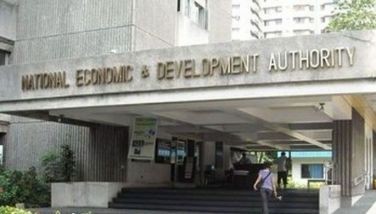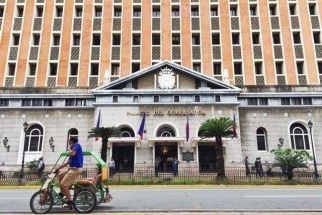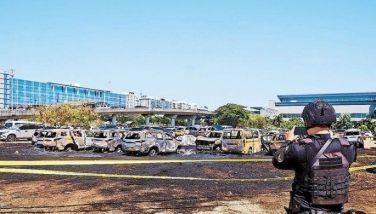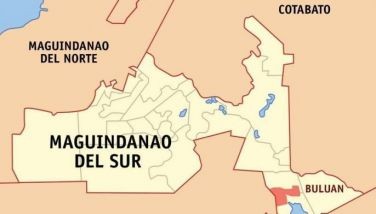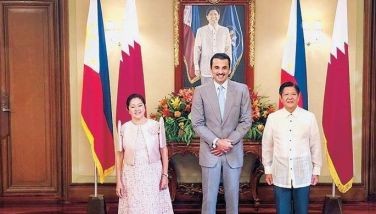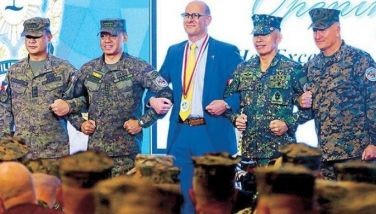World's eyes on Manila: What happened at ASEAN meetings?
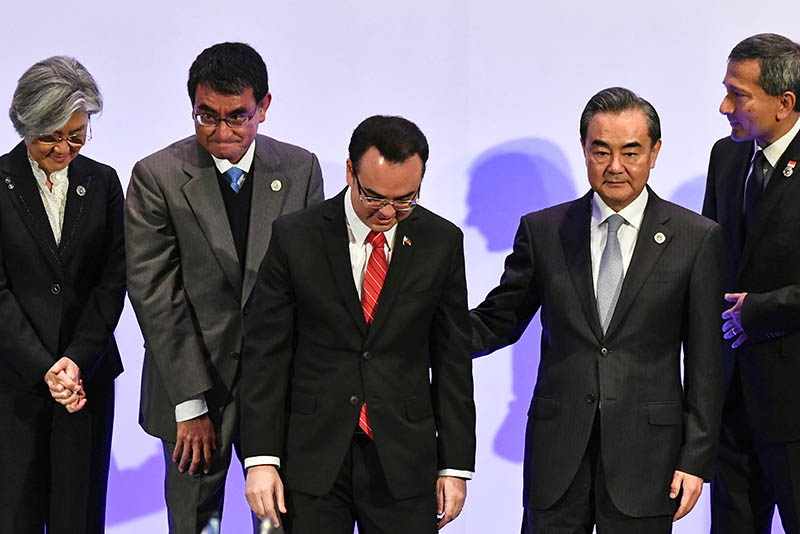
Foreign Ministers, from left, South Korea's Kang Kyung-wha, Japan's Taro Kono, Philippines' Foreign Secretary Alan Peter Cayetano, China's Wang Yi and Singapore's Vivian Balakrishnan walk after a family photo before the 18th ASEAN Plus Three Foreign Ministers Meeting, part of the 50th Association of Southeast Asian Nations (ASEAN) Regional Forum (ARF) meeting in Manila, Philippines, Monday, Aug. 7, 2017. Mohd Rasfan/Pool Photo via AP
MANILA, Philippines — The Philippines hosted a series of meetings of foreign ministers from Southeast Asia and the region, with the tensions on the Korean Peninsula and the South China Sea topping their agenda.
Here are the key developments and events surrounding the ASEAN summitry in Manila:
The stronger-than-expected communique
In a surprise move, ASEAN ministers issued a strong statement indirectly criticizing Beijing’s island-building and military-fortification activities in the South China Sea, defying Chinese stance on the issue.
In the bloc’s joint communique issued Sunday evening, the region’s top diplomats said that “land reclamations and activities in the area” have eroded trust and confidence, increased tensions and may undermine the peace and stability of the region.
The statement also made a vague reference to a UN arbitral ruling last year that invalidated Beijing’s expansive claims over the area.
The ministers also underscored the importance of “non-militarization and self-restraint” in the region to avoid further complicating and escalating tensions in the South China Sea.
The sea code outline
Although Southeast Asian nations and China agreed to adopt on Sunday a framework they could use to negotiate a code of conduct in the South China Sea, critics said that the outline’s failure to make the pact legally binding and to have a resolution mechanism made its effectiveness questionable.
The outline also provides a wide latitude to the negotiating parties which could result in disputes.
The Philippines and Vietnam still prefer the pact coming out of the framework to be legally enforceable, something Beijing would not assent to.
Critics say that China’s sudden interest in the talks for the code was just a ploy to elongate negotiation as it consolidates its activities in the South China Sea where it has built man-made islands and installed military facilities.
It also comes as the intentions of the US in the region become uncertain under the administration of US President Donald Trump. This, analysts say, weakens the negotiating muscle of the region.
The Chinese agenda for South China Sea talks
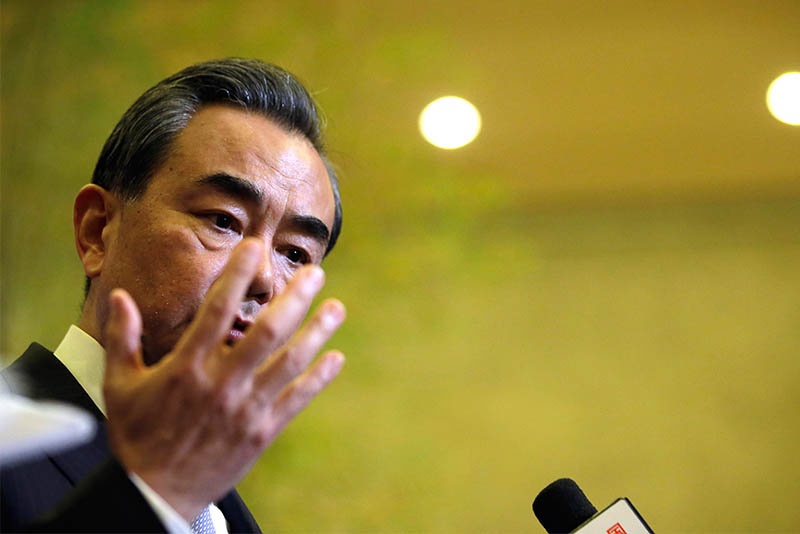
Chinese Foreign Minister Wang Yi gestures as he answers questions from reporters after attending the 24th ASEAN Regional Forum in Manila, Philippines, on Monday, Aug. 7, 2017. AP/Aaron Favila
China said on Sunday that talks on a code of conduct in the South China Sea may start within the year if “outside parties” would not cause a major disruption.
China’s foreign minister, Wang Yi, said that the start of the negotiations on the pact that would aim to prevent clashes in the disputed waters may be announced by the leaders of China and the ten member-states of ASEAN in their summit in the Philippines in November if their conditions were met.
Apparently referring to the US, Wang said that one of the conditions for the start of the talks would be non-interference by “outside parties.”
The strong words of US, Australia, Japan on the South China Sea
The foreign ministers of the US, Japan and Australia on Monday called for a halt on land reclamation and military activities in the South China Sea.
Secretary of State Tillerson, Australian Foreign Minister Julie Bishop and Japan's chief diplomat Taro Kono also called on the parties to the dispute to comply with the United Nations arbitral ruling last year that invalidated most of China's expansive claims in the area.
They also voiced their concerns over the maritime dispute where $3.37 trillion worth of trade passes through each year.
They said in a joint statement: "The ministers voiced their strong opposition to coercive unilateral actions that could alter the status quo and increase tensions."
Freedom of navigation and overflight, and internationally lawful uses of the seas should also be respected, according to the three top envoys.
Their statement on the issue was stronger than the stand of the 10-nation Association of Southeast Asian Nations, many of whom rely heavily on China for trade and investments.
ASEAN’s strong rebuke of North Korea
The Southeast Asia’s top diplomats slammed North Korea over its launch of intercontinental ballistic missiles in July and told Pyongyang to observe its obligations arising from United Nations resolution.
The foreign ministers of the 10 member-states of ASEAN said that the North’s tests of missiles capable of reaching mainland United States were a threat to the peace and stability in the region and the world.
The isolated country should also comply with its obligations in “relevant U.N. Security Council Resolutions,” the ministers said in the final draft of their joint communique.
The bloc also expressed its support for the peaceful denuclearization of the two Koreas, which technically remain at war with each other, and initiatives that would improve the relationship between Seoul and Pyongyang aimed at establishing peace on the peninsula.
The 'no' from North Korea
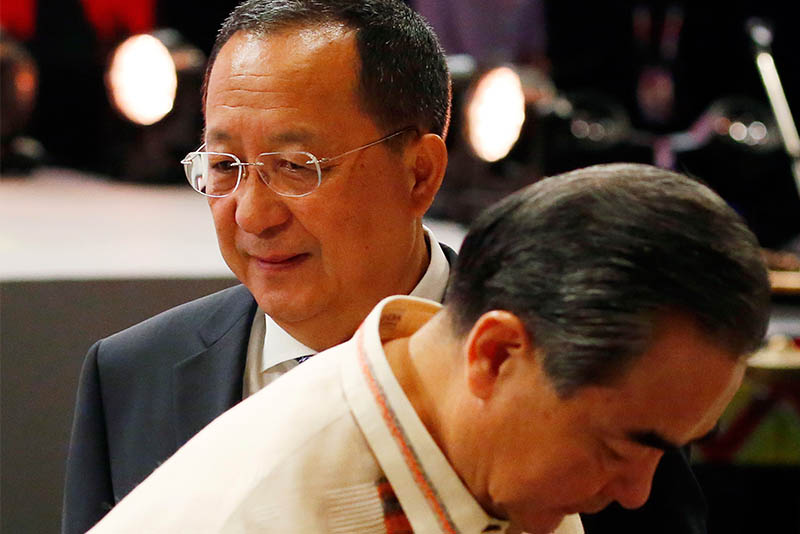
North Korean Foreign Minister Ri Yong Ho, left, arrives for the closing ceremony of the 50th ASEAN Foreign Ministers Meeting and its 50th Grand Celebration Tuesday Aug. 8, 2017 at the Philippine International Convention Center in suburban Pasay City, Philippines. Finding his seat in foreground is Chinese Foreign Minister Wang Yi. AP/Bullit Marquez
The North Korean foreign minister on Monday rejected putting their nuclear and missiles program on the negotiating table after the United Nations Security Council agreed on a sweeping set of sanctions on Pyongyang.
Foreign Minister Ri Yong Ho said that his country would not use its nuclear weapons on any country "except the US." He said that this would change only if another country joined the Americans in an action against Pyongyang.
He added that the North was ready to give Washington "a severe lesson with its nuclear strategic force." He also said that the responsibility over the tensions on the Korean Peninsula lies with Washington.
ALSO READ: North Korea to ASEAN: Distinguish danger of nuclear issue vs 'America First' policy
The human rights-less meeting between Duterte, Tillerson
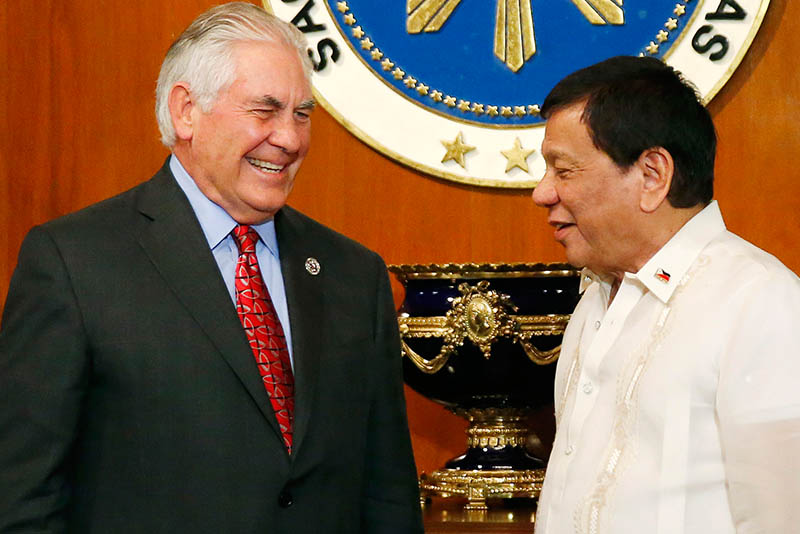
U.S. State Secretary Rex Tillerson, left, chats with Philippine President Rodrigo Duterte during the former's courtesy call at Malacanang Palace in Manila, Philippines, Monday, Aug. 7, 2017. AP/Bullit Marquez
President Rodrigo Duterte on Monday dismissed media questions about his government's human rights record and the American concern over this.
Instead, Duterte and US Secretary of State Rex Tillerson focused on the alliance between the two countries and the North Korean missile and nuclear arms program. Tillerson is the most senior Trump administration official to date who has met with Duterte.
“Human rights, son of a bitch,” Duterte said. “Policemen and soldiers have died on me. The war now in Marawi, what caused it but drugs? So human rights, don’t go there.”
The Philippine president said that he shouldn't be questioned about human rights considering the serious challenges he was facing.
The commitment against terror
The ministers of the members of ASEAN renewed their commitment to fight terrorism and prevent the so-called Islamic State from establishing a foothold in the region.
“In line with this, we reaffirmed our commitment to fight ISIS and other violent extremist groups to effectively curb their spread, as well as preventing them from gaining a foothold in the region,” the communiqué of the group read, referring to IS by its variant.
The top diplomats of the region also reiterated the need for a comprehensive, just and sustainable solution to the Palestine-Israel conflict in order to achieve peace and stability in West Asia (Middle East). — Video by Efigenio Toledo IV
- Latest
- Trending














